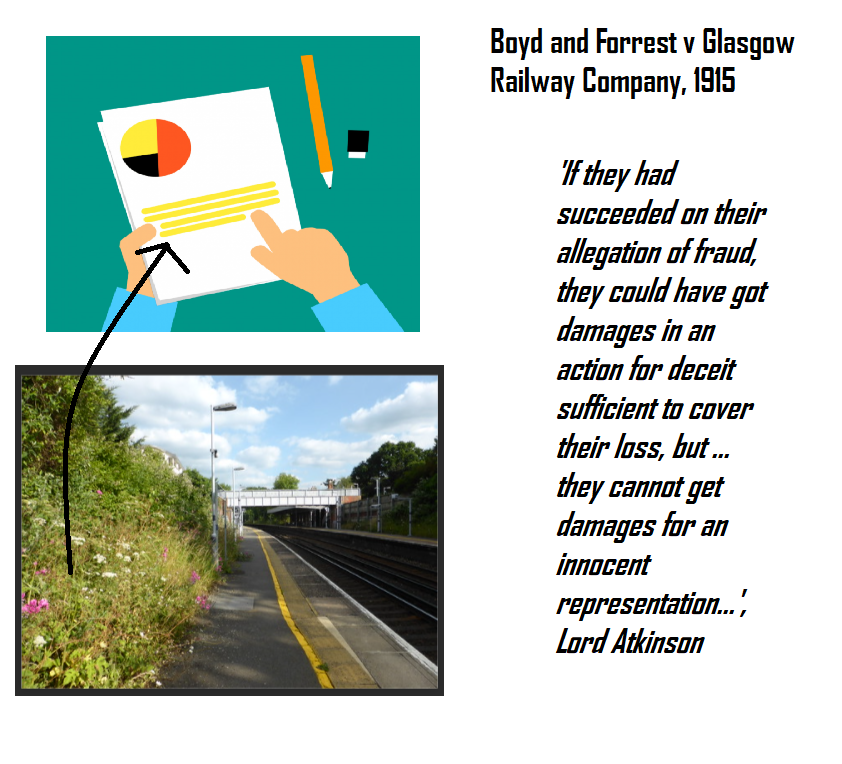Boyd and Forrest v Glasgow and S.W. R Co, [1912] ukhl 5
Citation:Boyd and Forrest v Glasgow and S.W. R Co, [1912] ukhl 5.
Rule of thumb:Rule of thumb: Where a misrepresentation has been made innocently then this can be used to reduce and end a contract, but it cannot be used to obtain damages.
Background facts:
The facts of this case were that Glasgow Railways lines had put out a tender for a company to build an embankment next to railway line for them in return for a pre-agreed lump sum payment. Boyd and Forest read the document with the tender, checked out the location and stated the price they would do the work for. Boyd and Forrest won the bid but the contract turned out to be more difficult than first envisaged. Boyd and Forrest completed the work but at a greater cost than they thought it would which reduced their profits. Boyd and Forest relied on falseoods in the document that turned out to be wrong and cost them more money to complete the job. Glasgow Railways refused to pay any extra money to Boyd and Forest.
Parties argued
Boyd and Forrest argued that the railway company had made fraudulent misrepresentations in the tendering document and that they should be paid for the extra costs and extra work which they did. Glasgow Railways argued that they had warned Boyd and Forest there may be inaccuracies and allowed them to assess everything for themselves. Glasgow Railways argued that the fact that they provided the warning and allowed access to the site reduced this to an innocent misrepresentation.
Judgment:
The Court upheld the arguments of Glasgow Railway. This was held to be a successful defence to damages for negligent misrepresentation to bring it down to innocent misrepresentation. Where someone has provided falsehoods, which were not fraudulent, and a potential contractor has been warned that these may be false and encouraged to check them for themselves, then this constitutes only an innocent misrepresentation where there are no damages for any losses incurred.

Ratio-decidendi:
‘The plaintiffs cannot take back what they gave—their work—though they might restore what they got—the money they received; that, however, is precisely what they are not required to do. The work was done; the parties cannot in any sense be restored, in relation to this contract, to the position they occupied before the contract was entered into. If they had succeeded on their allegation of fraud, they could have got damages in an action for deceit sufficient to cover their loss, but they have not sued for damages either for deceit or breach of contract, and they cannot get damages for an innocent representation made outside the contract, though inducing to it’, Lord Atkinson at 210
'If they had succeeded on their allegation of fraud, they could have got damages in an action for deceit sufficient to cover their loss, but ... they cannot get damages for an innocent representation...', Lord Atkinson
Warning: This is not professional legal advice. This is not professional legal education advice. Please obtain professional guidance before embarking on any legal course of action. This is just an interpretation of a Judgment by persons of legal insight & varying levels of legal specialism, experience & expertise. Please read the Judgment yourself and form your own interpretation of it with professional assistance.

